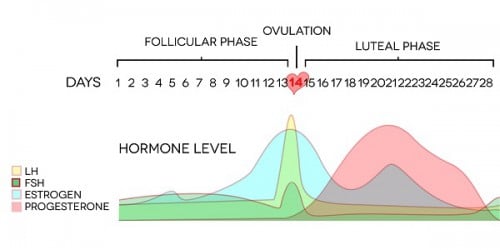
The menstrual cycle refers to the process a woman’s body undergoes to prepare for pregnancy. The menstrual cycle is broken down into phases in which the body goes through a series of physiological and hormonal changes in order to create a habitable environment for a pregnancy to happen. Each of the phases is unique to the reproductive process.
Throughout the menstrual cycle, the body goes through several self-regulating processes that allows for the many physiological and hormonal changes to take place.
Two pituitary hormones, the follicle stimulating hormone (FSH) and the luteinizing hormone (LH), regulate the cycle. These hormones help control the production of estrogen and progesterone by the ovaries.
For most women, the average menstrual cycle lasts 28 days and goes through three major phases: the menstrual phase, the proliferative phase, and the secretory phase.
What is the proliferative phase?
During the proliferative, or follicular, phase of the menstrual cycle the follicles inside the ovaries begin to develop and mature under the influence of follicle stimulating hormone (FSH).
The proliferative phase is in synch with the follicular phase. This process takes place from day 1 to day 14 of the menstrual cycle, and is part of the uterine cycle. During the uterine cycle, the endometrium (the lining of the womb) prepares itself for potential pregnancy. The uterus must undergo changes in order to prepare for implantation of the fertilized egg.
Only one follicle in either of the ovary will release the egg in the next phase of the cycle, the rest of the follicles will degenerate. The hormonal changes that occur during follicular phase thicken the endometrial lining to prepare the uterus for anticipated pregnancy.
The proliferative phase occurs after the menstrual phase during a period of tissue regeneration, in which the endometrium must repair itself and thicken. The endometrial glands increase in size and new blood vessels develop. At the beginning of the cycle, the levels of FSH increase, which in turn stimulates the ovarian follicles.
Although many of the follicles begin to mature during this phase, one proves to eventually become the dominant one. The dominant follicle emerges by day 5-6. The first follicle to become fully mature produces large amounts of estrogen, inhibiting the growth of other follicles, and will release the egg during ovulation.
During the proliferative phase, the ovaries begin to produce estrogen. As estrogen levels rise, the lining of the uterus begins to thicken. As a result of these rising levels of estrogen, the pituitary gland will slow the secretion of FSH and secrete more of the luteinizing hormone (LH) instead.
As the amount of LH increases, the mature follicle ruptures and releases the ovum, which then travels through the fallopian tubes. At the end of this stage, at around the 14th day, the endometrium is about 2-3mm in thickness.
The releasing of the mature egg is ovulation, and occurs about 14 days before the beginning of the next menstrual period. Ovulation will normally occur between the days 12-16 of the cycle. During this time, the woman is at her most fertile.
Disordered Proliferative Endometrium
During perimenopause, the woman’s hormone levels will fluctuate, causing an irregular hormone production. In turn, endometrial growth becomes irregular, disrupting the menstrual cycle. This is known as disordered proliferative endometrium, in which the growth and shedding of the uterine lining is not regular. Birth control pills can also cause this disruption in the cycle.
Basically, the proliferative phase is just one of many phases that help the progression of a healthy reproductive cycle. For women looking to get pregnant, avoiding habits like smoking and drinking caffeine can help strengthen ovarian function.
Even for women who are not interested in getting pregnant, allowing your menstrual cycle to function properly and healthily is key to having a better, less unpleasant cycle.
Image: Bigstock



